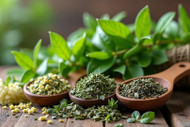Aniseed vs Star Anise: What’s the Difference?
Posted by Renae Colbert on 29th Apr 2025
If you’ve ever reached for a sweet, liquorice-like flavour while blending teas or spices, you may have come across aniseed and star anise—two beautifully aromatic botanicals with similar notes but very different backgrounds. At The Herbal Connection, we often get asked about the difference between these two ingredients. While they may share a similar flavour profile, these herbs come from different plant families, regions, and traditions.
In this blog, we’ll walk you through what makes aniseed and star anise unique, how each is traditionally used (especially in teas and herbal blends), and how you can choose the right one for your recipe or remedy. Let’s demystify these two powerful plants and help you feel confident using them in your wellness journey.
A Tale of Two Herbs: Origins and Plant Families
Let’s start with the basics—what are they and where do they come from?
Aniseed (Pimpinella anisum)
Aniseed, also called anise, comes from a flowering plant in the Apiaceae family—the same family as parsley, dill, and fennel. Native to the eastern Mediterranean and Southwest Asia, aniseed has been cultivated for thousands of years and was even prized by the ancient Egyptians, Greeks, and Romans for its sweet, aromatic qualities and digestive benefits.
Star Anise (Illicium verum)
Star anise, on the other hand, is a star-shaped spice that comes from the fruit of a small evergreen tree native to China and Vietnam. It belongs to the Schisandraceae family, which is entirely unrelated to aniseed’s plant family. Despite their similar names and flavour notes, these two herbs are not botanically connected—just a happy coincidence in taste.
Taste Profiles: Similar but Distinct
Both aniseed and star anise are famous for their sweet, spicy, and liquorice-like flavours, but if you taste them side by side, you’ll notice some subtle differences.
Aniseed: Soft and Sweet
Aniseed has a milder, slightly grassy sweetness with warm, herbal undertones. It blends beautifully with fennel, peppermint, and chamomile in teas and has a gentle, comforting presence in herbal formulas. It’s especially well-loved in Middle Eastern and Mediterranean cuisines and is often used in baked goods and liqueurs like ouzo and pastis.
Star Anise: Bold and Spicy
Star anise delivers a stronger, sharper, more intense liquorice flavour with warm, clove-like and peppery notes. It’s a staple in Chinese five-spice powder and often used in broths, soups, and slow-cooked dishes to add depth and warmth. Star anise is also used in herbal teas, where just one or two pods can infuse a whole pot with its bold flavour.
Traditional Uses and Health Benefits
Beyond their use in flavouring, both herbs have a long history in traditional medicine.
Aniseed Benefits
-
Digestive Support: Aniseed is well known for relieving bloating, gas, and mild digestive discomfort. It’s often included in herbal digestive teas.
-
Respiratory Health: Thanks to its expectorant properties, aniseed can help soothe coughs and clear congestion.
-
Mildly Calming: Its soothing scent and gentle action make it a lovely addition to calming blends, especially before bedtime.
How to Use It:
Try brewing aniseed tea by steeping 1 teaspoon of crushed aniseed in hot water for 5–10 minutes. You can also include it in chai blends or infuse it into syrups for desserts.
Star Anise Benefits
-
Antiviral and Antibacterial: Star anise is rich in shikimic acid, a compound used in antiviral medications. It’s often used in herbal immunity blends.
-
Warming and Circulatory Support: Its pungent heat supports circulation and may help the body stay warm in cooler months.
-
Soothing for the Gut: Like aniseed, it’s also used to support digestion and reduce gas.
How to Use It:
Add one or two whole star anise pods to a simmering pot of herbal tea, broth, or mulled cider. It’s especially comforting when paired with warming herbs like cinnamon, cloves, and ginger.
Aniseed vs Star Anise in Teas and Blends
Both herbs are fantastic in herbal teas—but knowing when to use one over the other depends on the effect you want.
-
Use Aniseed if you’re going for a softer, more mellow tea that supports digestion and relaxation.
-
Use Star Anise when you want a bold, warming tea with a stronger antiviral kick or spicy depth for winter wellness blends.
They also pair beautifully together, especially in spice-forward teas or immunity blends for autumn and winter.
Choosing Quality Herbs
At The Herbal Connection, we source both organic aniseed and organic star anise with care and integrity. Our herbs are selected for their potency, purity, and sustainability—because we know that the quality of each ingredient matters when it comes to supporting your health.
Whether you're formulating a new blend for your wellness brand or simply brewing a cup at home, you can trust our herbs to bring flavour and function in every scoop.
Final Thoughts: Which Should You Choose?
When it comes down to it, the choice between aniseed and star anise depends on your intention:
-
Want a gentle digestive tea or a sweet herbal flavour? Go with aniseed.
-
Need a bold, spicy note or something to warm the body and boost the immune system? Reach for star anise.
Whichever you choose, you’re tapping into centuries of herbal tradition—and at The Herbal Connection, we’re here to support you with the highest quality botanicals for every season, blend, and purpose.
Ready to Explore?
Browse our range of organic aniseed and whole star anise today and discover the difference that premium, consciously sourced herbs can make.
Let us help you bring your next blend to life—whether it’s a comforting digestive tea, a wellness tonic, or something uniquely yours.

